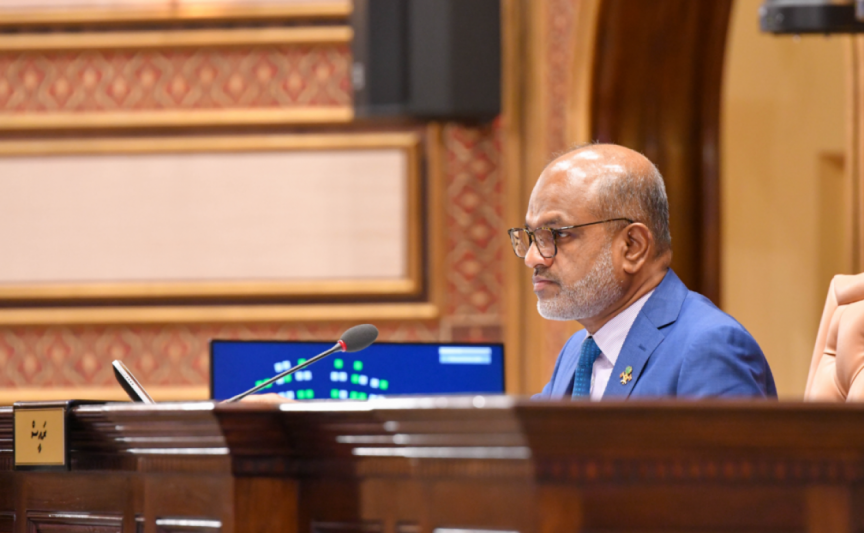
Deputy Speaker Ahmed Nazim presides over a sitting of the Parliament. (Photo/People's Majlis)
Parliament’s Deputy Speaker, Dhiggaru MP Ahmed Nazim, citing Supreme Court justices should remain independent from politics, said the Parliament “will do whatever is necessary” when the situation reaches a point where “political judgements” are delivered.
The preliminary debate on the amendment to the Judicature Act to downsize the Supreme Court bench from seven to five justices was held during Tuesday’s parliamentary sitting.
“I thank Almighty Allah for the blessing of being able to debate the bill to alter the number of Supreme Court justices while in this position. I say this as an individual who was sentenced to 25 years in prison by the Supreme Court; it is a remarkable coincidence that this issue has arisen while I hold this post, especially as I am most fitting to comment on the matter,” he said.
Nazim, who had been serving as the Parliament’s Deputy Speaker, during Yameen’s administration in 2015, was sentenced to life imprisonment after being found guilty of corruption. In this regard, he was accused of fraudulently winning a bid to sell 15,000 national flags to the Atolls Ministry, in line with an announcement made by the Ministry on December 31st, 2002. The bid was allegedly made under the names of four non-existent companies established by employees of Nameera Engineering Private Limited, a company in which Nazim holds shares.
The judgement was delivered by the former Supreme Court bench and has since been overturned.
“The judgement I am talking about was delivered by the full former Supreme Court. It is not wrong to say the judgement was delivered after calling me in while I was walking on the road in a case that had not been reviewed by the lower court nor the High Court,” he said.

Nazim noted that his lawyer back then had been current Supreme Court Justice Husnu Al Suood. As such, Nazim underscored that Justice Suood would have clearly witnessed how the Supreme Court should not act back then.
In spite of this, Nazim said we have witnessed the incumbent Supreme Court questioning the privileges of the parliament recently.
In this regard, Justice Sood had targeted multiple questions when the state argued the Supreme Court does not have the jurisdiction to hear the case challenging a contentious amendment to add anti-defection provisions to the Maldivian Constitution. He questioned whether the state is arguing that the Supreme Court would not have jurisdiction to overturn a constitutional amendment that is made, even if it states the Islamic religion is not the religion in the Maldives, contradictory to what is currently stipulated in the constitution.
Nazim underscored that Chapter Three of the Constitution allows inception and amendment of laws as long as it does not contradict the principles of Islam. As such, he stressed the Parliament will not be allowed to accept or debate on any laws that contradicts Islamic principles. Despite this, the Supreme Court putting forth this question, is questionable, he added.
Nazim also raised concerns about whether it was the appropriate time to alter the Supreme Court bench, given that Parliament is currently reviewing a case against the Court.
“There is a time for everything. Some lawmakers are saying it is not the right time to submit this bill. However, that “right time”, is not something that just comes by in a certain form,” he said.
Speaking further, Nazim said ruling PNC was given super majority in the Parliament to resolve issues like this within the nation, especially ones concerning citizens that are ringing alarm bells.
He cited a current issue, stating that individuals who should remain independent from politics are seen getting entangled in politics and ready to follow any beat set by political leaders.
His remark comes after Supreme Court decided to proceed with the case challenging the amendment to add anti-defection provisions to the Maldivian Constitution despite arguments from the state the court does not have jurisdiction.
Former Kendhoo MP Ali Hussain, an attorney-at-law, filed a constitutional case with the top court on November 24, seeking to have the new provisions annulled.
“We are the individuals in politics. We will decide on political issues on the [parliament] floor. We will debate on political issues here. Hence, judges should be individuals who are independent from this. We have seen this not happen this way,” Nazim said.
Nazim emphasized that the Supreme Court is one of the three branches of the state and carries a sacred responsibility.
“We are witnessing criminals being released and holding political events from the sitting rooms of their homes. Therefore, we, as Parliament, which is empowered to safeguard the privileges of Parliament, the rights of lawmakers, and the rights of citizens, should not hesitate to take action when criminals are set free, when innocent people are imprisoned, and [judges] become entangled in politics and deliver political judgments,” he said.
“We have the guts. When called for, we will do it,” he added.
The number of Supreme Court justices has been changed during previous administrations as well. In this regard, former president Abdulla Yameen Abdul Gayyoom downsized the Supreme Court bench from seven to five in 2014. His successor, Ibrahim Mohamed Solih increase the bench from five to seven.